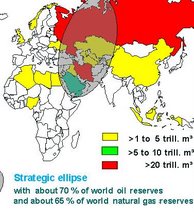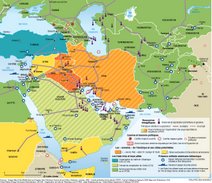by: Ira Chernus,

I scan three Israeli newspapers every day (well, actually, their web sites, in English). It's less like visiting a foreign country than like visiting a foreign planet. The obsession with Iran's supposed nuclear weapons development is incessant - as if the Iranians were going to drop the big one on Tel Aviv any day now. The obsession with the intricacies of Israeli-Palestinian politics is equally incessant. That's more understandable, perhaps.
But on Planet Israel, the Palestinian issue is presented in ways that would strike most of Planet Earth as just a bit odd, to say the least. Prime Minister Bibi Netanyahu's decision to freeze settlement expansion for ten months was huge news. Speculation about the impending decision made headlines for weeks. When it was finally announced, the Israeli press treated it as a major event, perhaps a decisive turning point in the whole decades-long conflict. The fact that Palestinians leaders were unimpressed made headlines, too.
But Israelis who read only their own nation's newspapers would have missed the crucial point: The rest of the world was not merely unimpressed. If the rest of the world noticed Bibi's "huge concession" at all, it merely yawned and turned back to news that really mattered. Outside of Israel, whether Bibi and his government offered to stop settlement expansion for ten month, or ten days or perhaps even ten years, didn't matter much at all.
The rest of the world, when it pays attention to the Israeli-Palestinian conflict, has decided long ago that the Netanyahu government is far more interested in public relations gestures than in a meaningful peace process. The rest of the world knows that if Israel were obeying international law it would not merely stop expanding settlements. It would dismantle the existing settlements - which are all illegal, according to the Fourth Geneva Convention - and bring the settlers back inside the Green Line (Israel's border of June 4, 1967, before it captured the West Bank).
Here on Planet Earth, we can see that Israel's obsession with the minutiae of its policies in the occupied territories miss the main points entirely. It's not just that the settlements are illegal. The settlements are merely one arm of a multi-armed monster called The Occupation. If all the settlements disappeared today, residents of the West Bank would still face a massive Israeli presence, both military and civilian, that makes anything remotely like normal life impossible.
And even if that massive presence were to disappear, West Bankers would face an Israeli economic stranglehold that imposes an intolerable level of unemployment and poverty. Just ask the people of Gaza. They are free of Israelis in their territory (except for the underground operatives who no doubt remain). But with Israel blockading the borders, Gazans have limited access to the necessities of life and no way to predict whether things will get better - or more likely worse - tomorrow. Business just can't operate in that unpredictable atmosphere.
The details are different in the West Bank, but the basic principle is the same: an economy at the mercy of a hostile foreign power. Add that economic stranglehold to the constant harassment by Israeli functionaries (many of them armed, annoyed, angst-ridden teenagers), plus the constant presence of Jewish settlers given all sorts of privileges by the authorities, and the rest of the world can see that the injustice is intolerable, no matter how much the settlements do or do not expand.
That's not to say the settlement expansion issue is irrelevant. For those who follow the issue closely, it is important to know that, according to Israel's leading newspaper, Ha'aretz, "there will be nearly no change in settlement construction, at least not in the coming months." Some 2,500 units under construction will be finished; "the construction of a further 490 units was recently approved in an unusual move by Defense Minister Ehud Barak"; and "hundreds of new housing units are in the process of construction," even in settlements where they have not been authorized.
Another report adds that "the state is expected to ask the Supreme Court for more time to evacuate illegal outposts." Most importantly, Netanyahu's ten-month freeze excludes everything that Israel calls Jerusalem, an enormous territory where Israel will be free to build as much as it wants. All of this reinforces the common Palestinian view that (as a popular saying puts it), "Israel wants to negotiate with us about who gets how much of the pizza while they keep gobbling it up in huge bites."
Nevertheless, the Israeli media's obsession gives Israelis the impression that these fine points matter all over the world. So, they miss the crucial point: All over the world, people who pay attention have long ago decided that Israel is perpetrating an outrage and must immediately agree to a fully independent Palestinian state, governing virtually all of the West Bank and Gaza. The details taken so seriously on the front pages in Planet Israel look like merely so many stalling tactics to everyone on Planet Earth.
Well, perhaps there are two places outside of Israel where these details are taken seriously: the White House and the State Department. Words coming out of those two buildings in DC suggest that the ten-month freeze is a big deal. Of course, what the decision makers inside those buildings are really thinking, no one knows.
But in the world of international relations, appearances can matter as much as reality. Indeed, appearances often are the reality. The Obama administration is giving the impression that it lives inside the same bubble as the Israeli government and media - the bubble of Planet Israel. Here are the president of the United States, his secretary of state and their highest aides apparently missing the point entirely, agonizing over details that the rest of Planet Earth find trivial at best, if not totally irrelevant. It makes the administration look supremely out of touch with reality.
That's not merely embarrassing. It is dangerous. In his speech in Cairo, Obama rightly said that resolving the Israel-Palestine conflict is in the US's interest. But how can US leaders conduct an intelligent foreign policy, one that promotes American interests, if most of the rest of the world is laughing at them and refusing to take them seriously?
The administration has already embarrassed itself by repeatedly demanding a total halt to settlement expansion, then repeatedly backing away from that demand. To treat the Netanyahu proposal as a serious step only adds to the embarrassment, rubs salt in the wound to American credibility, and reinforces the impression that the administration is supporting unjust Israeli policies.
The rest of the world will not be surprised. Washington's "pro-Israel" tilt is an old familiar story. (Washington living inside a bubble is equally familiar. The rest of the world wonders what planet we Americans are living on when it sees us obsessing about the details of a health care reform that will still leave us spending much more money than any other industrialized nation for a level of health care far inferior to the rest.) But the rest of the world will be discouraged from developing more constructive relations with us on a government to government level.
If Israel's government, its media and perhaps most of its people want to live inside a bubble of unreality, which makes it impossible for them to have constructive relations with the rest of the world, I suppose that's their business. When they use their unrealistic perceptions to justify continued oppression of Palestinians, it becomes my business, because I'm Jewish, and Israel has always claimed to be acting on behalf of all Jews. So, I have to stand up and say, "Not in my name."
When the US government joins Israel inside its bubble of unreality, if you are an American, then it's your business, because of the grievous harm it does to our nation's standing around the world. It's easy enough to say that there is no point in standing up and protesting, that the US is under Israel's thumb, that resistance is futile. But if that were true, the Obama administration would never have called for a total halt to settlement expansion in the first place.
It makes more sense to see that as a trial balloon, testing the political winds here at home as well as internationally. On the home front, the administration apparently got a bigger gust from the right than from the left in the past half year. That means resistance to the right, far from being futile, is all the more urgent and necessary now.
Perhaps, we can't expect our friends and neighbors to care deeply about the plight of the Palestinians. Yet, we can expect them to care about the plight of their own government when it's trapped in a bubble of unreality. We can expect them to demand that their government return to Planet Earth.





























